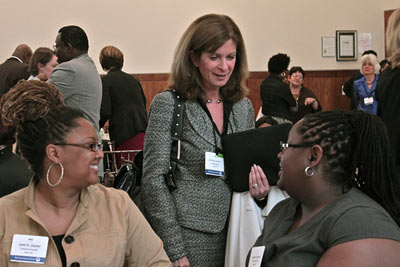Opperman describes Cornell's new model for diversity at national conference
By Caroline Shin

The timing couldn't be better. Just as MetLife and Goldman Sachs agreed to release their workplace race and gender reports this year, Cornell is introducing a campuswide model for diversity, according to Mary George Opperman, vice president for human resources and safety services.
She was among several Cornell panelists who spoke at the third annual Diversity in Higher Education and the Workplace Conference, April 18-19, at the Bishop Desmond Tutu Conference Center in New York City. Co-sponsored by Cornell -- including the Office of the Provost and the ILR School and its Employment and Disability Institute -- the conference focused on sustainable inclusion, drawing panelists from MetLife and the U.S. Department of Labor, and attracted nearly 125 attendants.
Other Cornell panelists included Judy Young, assistant director of training and development; Susanne Bruyère, associate dean of outreach and professor of disability studies; and Kathleen Lee, business outreach specialist.
While diversity figures have been steadily improving, disparities remain. According to the U.S. Department of Education, total fall enrollment in U.S. degree-granting institutions comprised 62 percent whites, 14 percent blacks and 13 percent Hispanics in 2009. The 2011 labor force was 47 percent women, 15 percent Hispanic or Latinos, 11 percent blacks and 5 percent Asians, according to the U.S. Bureau of Labor Statistics.
Speaking at the "Current Landscape of Diversity and Inclusion in Higher Education and the Workplace" session, Opperman announced a plan that's in the works to place a needed emphasis on diversity and inclusion at Cornell.
Though it's still incipient, the plan essentially changes the diversity model's points of accountability and measureable outcomes, Opperman said.
The university's deans and vice presidents have been asked to identify five initiatives each year that will advance diversity and inclusion in four key areas -- composition (required), engagement, inclusion and achievement -- and to report on their progress at year's end.
Opperman added that the development of the plans is under way and there is still much work to be done in developing a comprehensive plan from the individual plans. Colleges and units are thinking through various aspects of diversity for the different populations of the university, and many have formed diversity councils to develop their priorities. "We are in the early stages of an initiative that I hope will create a much more inclusive university of the future," stated Opperman.
Other issues addressed at the conference ranged from building cultural capital and improving Latino student and employee attainment to connecting career services with offices of students with disabilities and global diversity and inclusion benchmarks for organizations around the world.
Caroline Shin is a freelance writer in New York City.
Get Cornell news delivered right to your inbox.
Subscribe